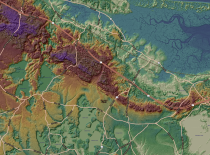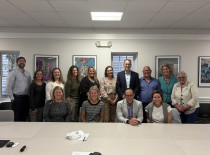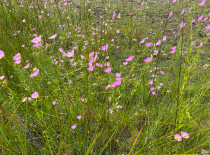Category: Newsletter
Cape Cod’s architecture helps define its sense of place. The thousands of historic structures in the region do more than recall the past, they define how the Cape looks and feels today. Historic buildings are more than just the backbone of Cape Cod’s distinct character; they are the foundation for our community’s identity. Future development and redevelopment efforts are rooted in preserving the character and identity that make Cape Cod unique.
Hundreds of Geographic Information Systems (GIS) professionals gathered in Falmouth this week for the annual New England Arc Users Group fall conference, an event designed to build connections and advance professional growth. The Cape Cod Commission was well represented, with staff showcasing how GIS technology supports planning, environmental stewardship, and storytelling across the region.
Cape Cod Commission staff and the Barnstable County Economic Development Council (BCEDC) recently welcomed newly appointment Massachusetts Economic Development Secretary Eric Paley and Undersecretary Ashley Stolba for a discussion on Cape Cod’s economic challenges and opportunities. The conversation brought together state and regional leaders to explore workforce needs, housing pressures, innovation, and long-term strategies for sustaining a vibrant year-round economy.
Recognizing the important ecosystem services native plants provide, Commission staff are developing an updated list of native plants for use in local and regional planning. Using the comprehensive plant list featured in the Cape Cod Freshwater Pond Buffer Guidance as its foundation, the updated list will include additional native species and indicate which are suited for upland and coastal environments as well as freshwater pond buffers. Created as part of the Freshwater Initiative, the Pond Buffer Guidance highlights the ecological benefits of native plants and their role in supporting healthy habitats.
The Mass Broadband Institute (MBI) is offering the Connected & Online Program, a new initiative that will distribute up to 27,000 internet-enabled devices, along with assistive technology and supportive equipment, to eligible organizations across Massachusetts. The goal of the program is to expand access to education, workforce training and telehealth by establishing public device lending programs and on-site device stations, especially in Gateway Cities and rural communities. Devices will be fully loaded with software, selected accessories and warranties at no cost to awardees. Funding is provided by the U.S. Treasury Capital Projects Fund (CPF).
Natural systems are central to Cape Cod’s identity and resilience, shaping the region’s environment, economy, and quality of life. A series of lightning talks by Commission staff highlighted efforts to protect ponds, enhance outdoor access, and build resilience in the face of climate stress, sharing practical actions communities and residents can take.
Across multiple sessions, speakers at OneCape 2025 examined Cape Cod’s infrastructure not just as pavement and projects, but as the foundation of daily life, safety, and community character. Together, the discussions highlighted how bridges, streets, transit, preservation, and redevelopment can be designed with people at the center.
Across Cape Cod, leaders are moving from diagnosing the housing crisis to delivering solutions. At OneCape, state officials, local innovators, and community partners highlighted strategies, from adaptive reuse to deed-restricted rentals, that are showing that the Cape can expand year-round housing while preserving its character.
The impacts of climate change, including erosion, sea level rise, flooding, and increased coastal storms, are reshaping Cape Cod today. At the 2025 OneCape Summit, regional and state leaders addressed the urgency of climate challenges and the innovative responses already underway.
At this year's OneCape Conference, Erin Perry, Deputy Director of the Cape Cod Commission, reflected on the 10-year journey since the adoption of the region's Section 208 Water Quality Management Plan. She reminded the audience that in 2015, wastewater was the central topic of discussion: "Ten years ago at OneCape, all we talked about was wastewater - it was the entire content of the summit."






